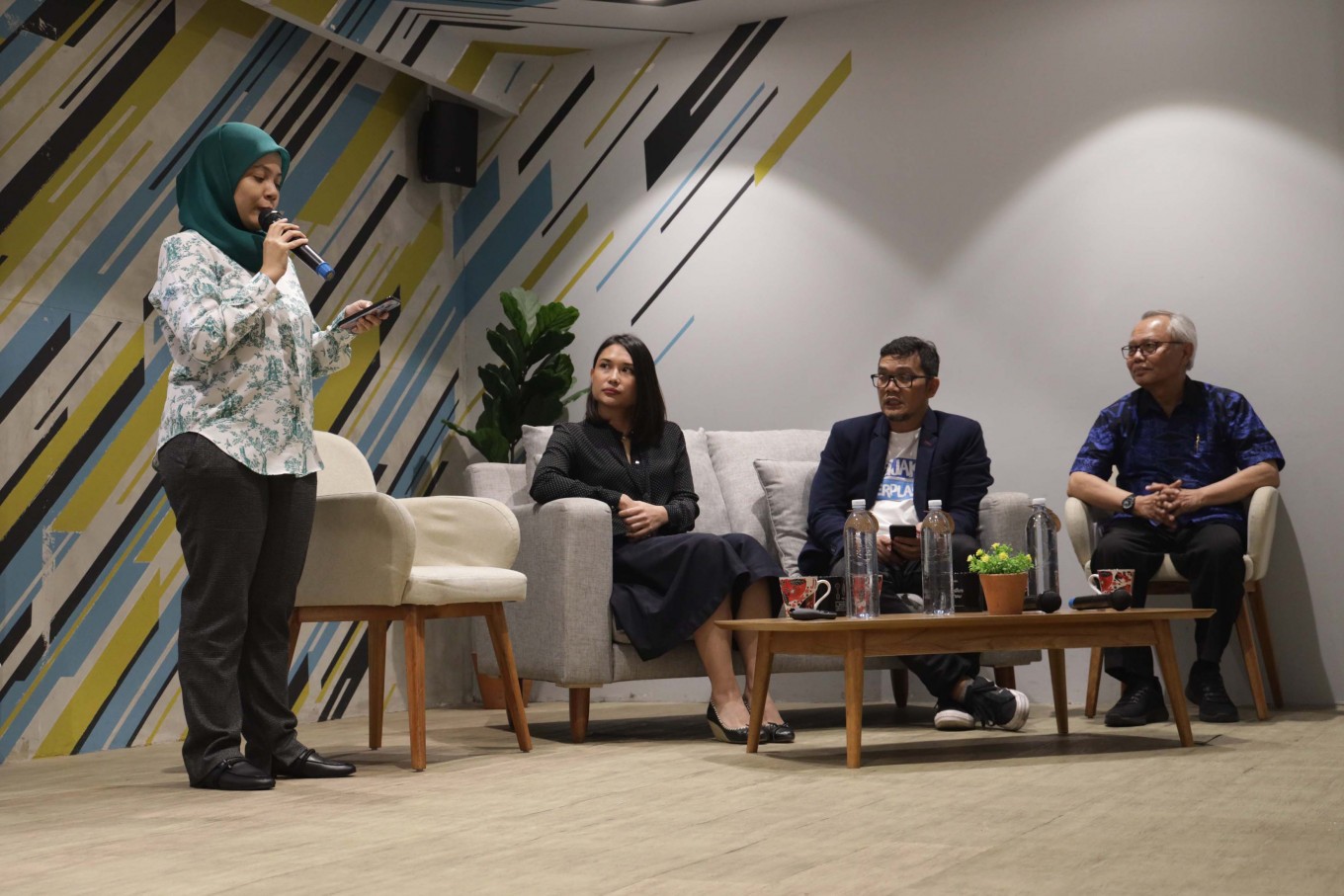Popular Reads
Top Results
Can't find what you're looking for?
View all search resultsPopular Reads
Top Results
Can't find what you're looking for?
View all search resultsCircular economy going around in circles, experts say
While most plastic waste in Indonesia is recyclable, Enri pointed out that recyclers only accepted about 30 percent of all types of plastic waste found in the country. The remaining share ended up in landfills.
Change text size
Gift Premium Articles
to Anyone
 Save the Earth: Diet Kantong Plastik (Plastic Bag Diet) movement director Tiza Mafira (second left), Karyanto Wibowo (second right) of Danone Aqua and Bandung Institute of Technology professor Enri Damanhuri (right) listen to The Jakarta Post General News Desk editor Adisti Sukma Sawitri speak at The Jakarta Post Yearender 2019 seminar at GoWork in FX Sudirman, South Jakarta, on Thursday. (JP/Dionnasius Aditya)
Save the Earth: Diet Kantong Plastik (Plastic Bag Diet) movement director Tiza Mafira (second left), Karyanto Wibowo (second right) of Danone Aqua and Bandung Institute of Technology professor Enri Damanhuri (right) listen to The Jakarta Post General News Desk editor Adisti Sukma Sawitri speak at The Jakarta Post Yearender 2019 seminar at GoWork in FX Sudirman, South Jakarta, on Thursday. (JP/Dionnasius Aditya)
T
he circular economy has been hailed as the best way to solve the ever-piling plastic waste problem in Indonesia, but observers argue that the country lacks the integration to make it work.
Indonesia produces about 64 million tons of waste annually, according to February data from the Environment and Forestry Ministry. Of the total figure, about 15 percent is plastic waste, much of which is food and beverage packaging and plastic bags.
The majority of the waste, however, is not processed properly, according to Enri Damanhuri, a professor of waste management at the Bandung Institute of Technology (ITB).
He cited 2018 data from the National Development Planning Agency (Bappenas) that found that only about 36 percent of waste was collected and transported to final disposal sites, while more than 60 percent was left unmanaged.
“This prevents waste from reaching recyclers to be processed back into raw materials for production, thereby stopping the circular economy from working,” he said at a discussion on the plastic waste crisis held by The Jakarta Post in South Jakarta on Thursday.
The circular economy is a sustainability concept that seeks to minimize waste by deploying resources optimally through reuse, recycling and remanufacturing.
The government has issued a number of regulations at the national level to promote the approach, including a 2008 law on waste management and a 2017 presidential regulation on waste management regulation and national strategy.
The latter lays out President Joko “Jokowi” Widodo’s ambitious plan to reduce the country’s waste volume by 30 percent and recycle 70 percent of the country’s waste by 2025.
“However, the regulations have not yet been carried out properly because the stakeholders involved in waste management in Indonesia have not been connected at all, such as with waste collection,” Enri said.
While most plastic waste in Indonesia is recyclable, Enri pointed out that recyclers only accepted about 30 percent of all types of plastic waste found in the country. The remaining share ended up in landfills.
Enri said this was because recycling in Indonesia was done mostly by informal players that had a limited ability to process the waste.
“Both the government and recyclers should improve the system to make sure all types of plastic waste can be processed in the circular economy,” Enri said.
Diet Kantong Plastik (Plastic Bag Diet) movement director Tiza Mafira said it was also necessary in a circular economy to promote changes in the behavior of consumers and producers.
“Waste management should be everyone’s responsibility rather than just the government’s or recyclers’. It is impossible for the government to bear the whole burden,” Tiza said.
Tiza added that producers should redesign their products to make them more recyclable rather than just visually appealing to buyers.
This would create demand for recycled plastics. Demand is currently low in the country because new, previously unused plastic is inexpensive, she continued.
Consumers should change their single-use mindset, and the government should limit access to single-use products, she said.
“These changes have to be made as a community rather than being undertaken by individuals.”
Karyanto Wibowo, the director for sustainable development at Danone Aqua, a company known for producing bottled water products, said the company had taken several measures to support the circular economy in the country.
One of them was launching a plastic bottle made completely from recycled plastic. He said the company had collected 12,000 tons of PET bottles so far to recreate its products through collection points and recycling centers in the country.
“The company obeys the principles of the circular economy by ensuring that our recycled plastics have the same or higher quality than virgin plastics. This is to make sure that there is a demand for the recycled ones,” Karyanto said.









